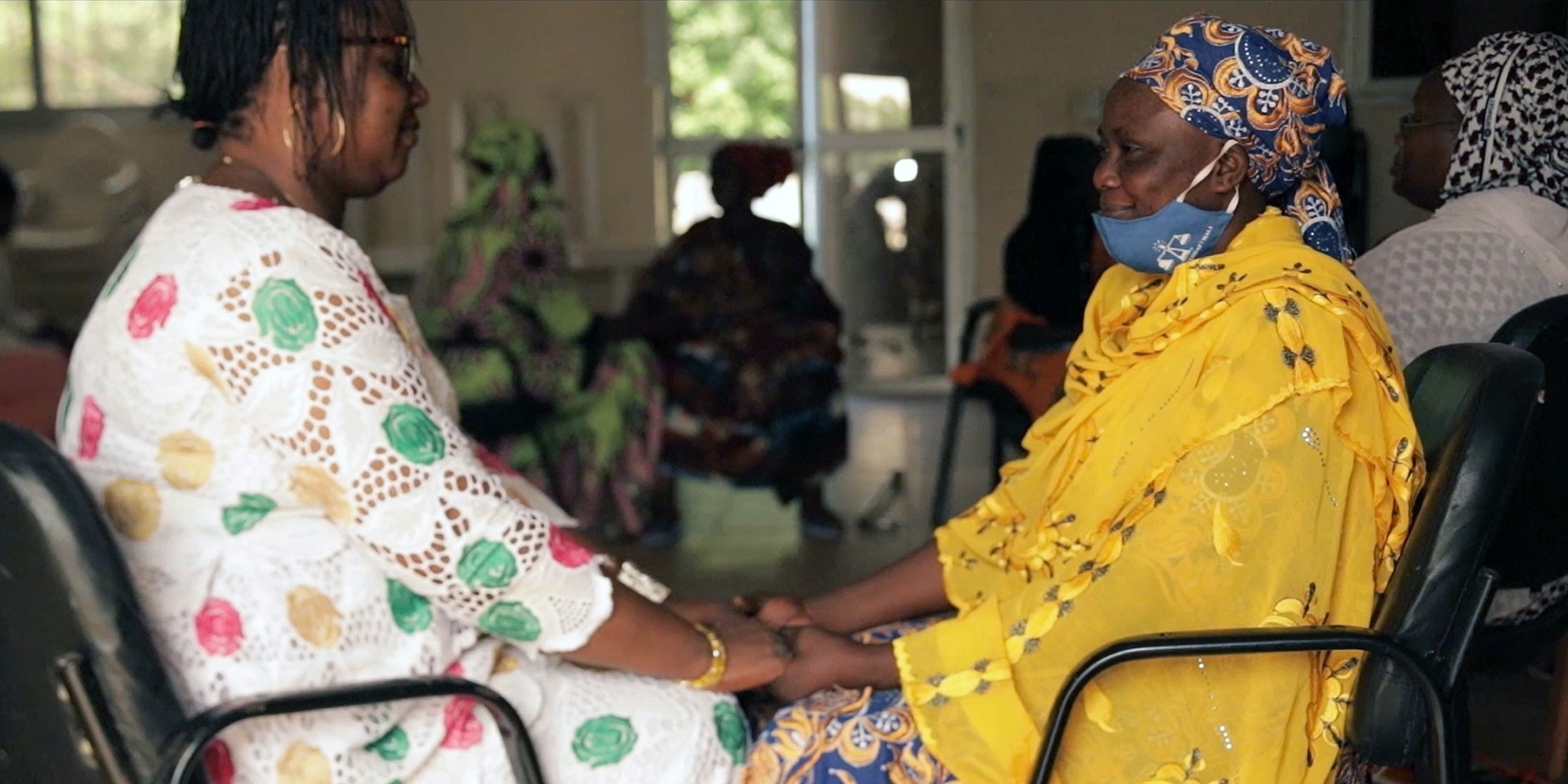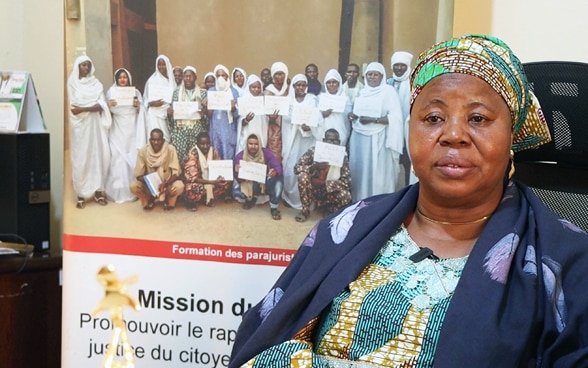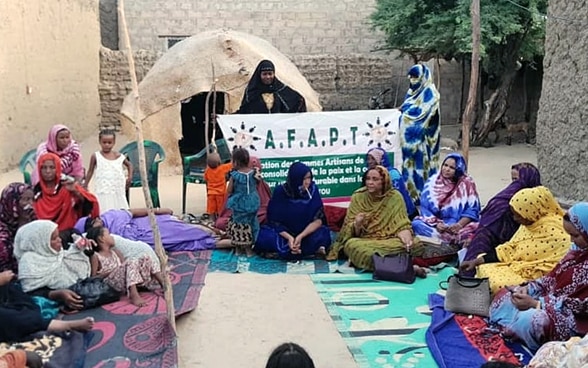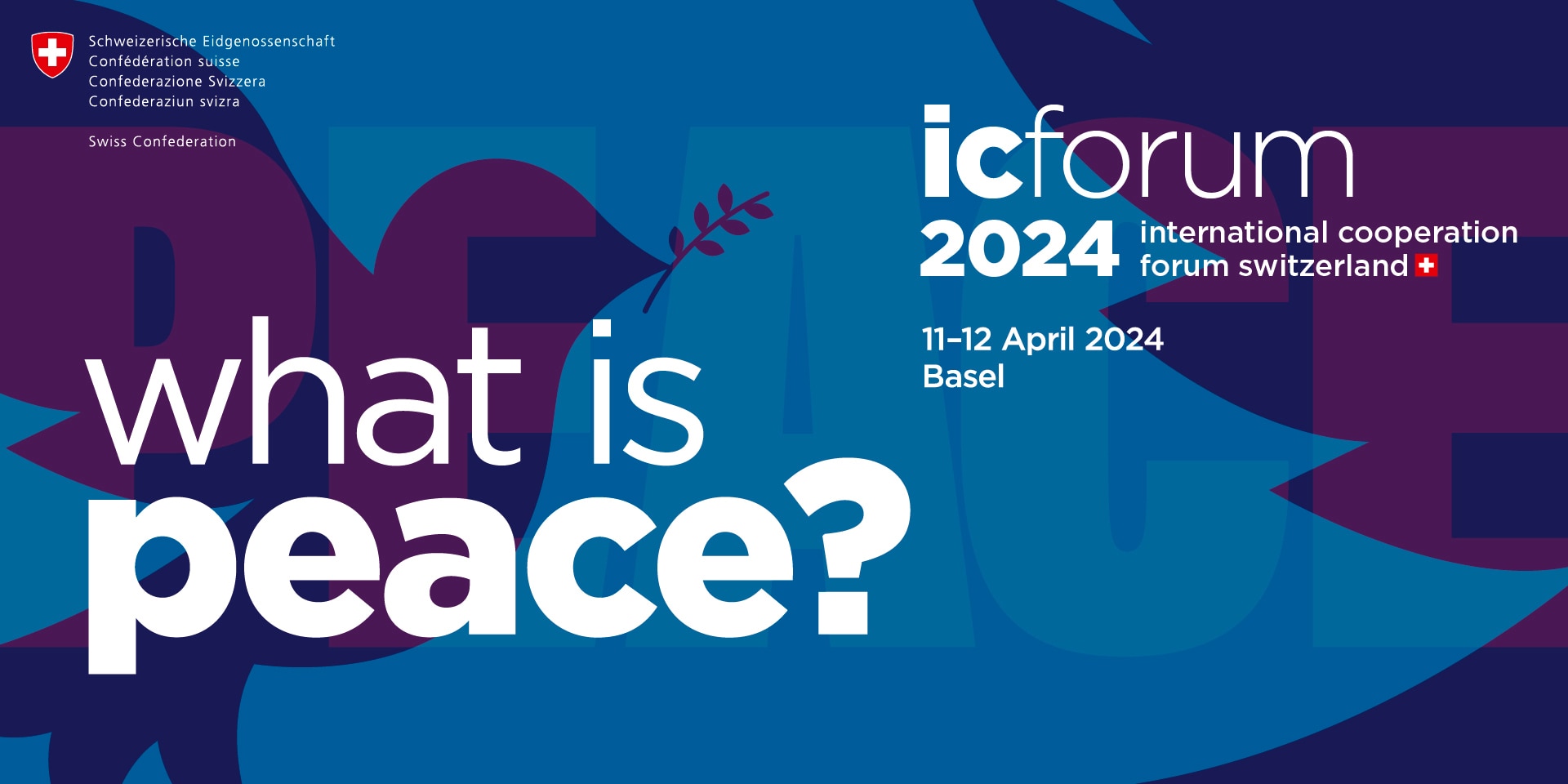Women in Mali: peacebuilders
How can women's engagement in peace processes be promoted? Circles of Peace is an innovative project allowing Malian women from different backgrounds, social classes, religions and political affiliations to play a key role in the peace and reconciliation process in Mali. Bouaré Bintou Founé Samaké, the executive director of the NGO WILDAF/Mali, tells us more.

Exercise on dealing with emotions during a Circles of Peace session. © WILDAF Mali
Since the Algiers agreement was signed in 2015, Mali has embarked on a peace process aimed at resolving tensions and securing peace in the country and wider region. Over the last decade, Malian women have been profoundly affected by the conflict but have simultaneously played a key role in maintaining social cohesion. In spite of this, their involvement in the implementation of the peace agreement has only been marginal.
Since 2015, Switzerland has been supporting the Circles of Peace project in Mali launched by the NGO Women in Law and Development in Africa (WILDAF) to promote the inclusion of women in Mali's peace process. The project aims to empower and enable Malian women to play an active role in their country's peace and reconciliation process. Switzerland's initiative is also in line with UN Resolution 1325 and Mali's related national action plan, which sets out measures aimed at increasing respect for women's rights, providing better protection against violence, and fostering greater inclusion for women in peace processes.
The project brings together women from all of Mali's regions regardless of class, origin, religion or political affiliation. It provides them with a space to share their experiences of the conflict and discuss the country's future together. Sharing stories in this way creates links between the communities. The importance of this platform is to enable Malian women to be fully included in building a peaceful future for their country.
Former Minister for the Promotion of Women, Children and the Family, Bouaré Bintou Founé Samaké, is the executive director of WILDAF/Mali. These are her reflections on the project given the current context in Mali. She will also be appearing as guest speaker at the Sahel roundtable during the IC Forum on 11 April 2024 in Basel.

What has the Circles of Peace project achieved since it was launched in 2015? What influence have the women been able to exert?
More than 200 peace circles have been held in Mali since the project was launched back in 2015. This means that more than 3,000 women have gained a greater understanding of the challenges linked to their country's lack of peace and the need for Malian women to commit to building lasting peace.
Each circle usually has between 20 and 25 participants, with the minimum number set at 15. They foster constructive dialogue between the women by creating a conductive environment geared towards peacebuilding. At the heart are common values – inclusion, acceptance, equality and an appreciation for difference and diversity. In the circle, women can connect and explore their role as creators of peace – in their own lives, their families, and their wider communities. This inspires them to promote reconciliation and peacebuilding through concrete action on the ground.
Thanks to the project, Malian women have succeeded in influencing high-level decisionmakers to factor peacebuilding mechanisms into their policies. They are also making their voices heard on issues concerning peace and security, establishing themselves within the related mechanisms at both local and national levels. The fact that a number of women involved in the circles now hold positions in the National Transition Council and have held ministerial positions in Mali's government is a great source of pride. I also used to be a minister.
Given the current political and security context in Mali (United Nations Stabilisation Mission in Mali/MINUSMA withdrawal, end of Algiers peace agreement), what role can women or the Circles of Peace play in order to continue the peace process?
The termination of the Algiers agreement and MINUSMA's departure have left a lot of people frustrated, particularly young people with or without diplomas in the Timbuktu, Gao, Ménaka and Kidal regions. This is because MINUSMA was a major source of direct and indirect employment that many families relied on. Because of the layoffs linked to the withdrawal, a lot of families have fewer resources. There's also been a sharp rise in the number of jobless people. These are factors that are undermining the relative peace in Mali and the subregion.
The Circles of Peace project plays a key role in trauma response and the peaceful management of conflicts, making it an essential element in Mali's peace process. Participants can start to rebuild their mental health and open up to new perspectives on life, autonomy and resilience. The circles should be extended to small towns, villages and neighbourhoods to help calm the hearts and minds of our people, and to contribute to Mali's security and political reforms. They are also effective in helping to prevent gender-based violence, prepare young people for marriage and promote peaceful coexistence.
Given the current situation in our country, we're redoubling our efforts. In Timbuktu, for example, we've just set up a series of sessions for young men. This was requested by a group of mothers and the regional council as well.

What are some of the advantages?
Circles of Peace offer a better understanding of the challenges and issues linked to conflicts. Participants also gain a deeper understanding of themselves. These two aspects are essential for conflict resolution. In addition, the circles help people deal with trauma and heal memories. A greater understanding of forgiveness, which enables us to live in peace with ourselves and create peace around us, is also one of the key takeaways. When you take part in a circle, you open yourself up to new perspectives and the quest for creative initiatives. Wherever you go, you try to create peace – in your community and all around you. This is my personal experience from having taken part in the project.
You will be taking part in the IC Forum on 11 and 12 April in Basel, in particular in a session devoted to peace in West Africa. What message are you hoping to send?
The Sahel region is facing difficult times, and support from all our partners is crucial. As drivers of change and innovation, women and young people need your support more than ever. To the people of the Sahel, I say: Let us be vehicles for peace, not hate. You can't negotiate peace through the barrel of a gun. It can only be achieved peacefully. And to the women of Mali, this is my message: let us continue the fight, so that peace becomes a reality – in our families, in our communities, in our country, and throughout the world. Let us continue to work with the younger generations so that our children and grandchildren can live in a world of peace.
Commitment of the Swiss Agency for Development and Cooperation (SDC)
The SDC has been active in West Africa since the 1970s in the following areas:
- rural development: working with farmers' and livestock associations to improve value creation,
- education: creating prospects for the largely young population,
- governance and decentralisation: improving basic services at sub-regional level and promoting women's rights and media freedom.
Against the backdrop of the Sahel region's multidimensional crisis, which has been ongoing for several years, the SDC has adapted its programmes and is now increasingly working in the nexus, i.e. at the interface between humanitarian aid, development and peacebuilding. This means supporting urgently needed food security programmes, financing schooling in refugee camps and providing services for internally displaced people, for example. The SDC has also stepped up its contribution to conflict transformation and the promotion of social cohesion in West Africa. It is ideally positioned to work on these issues thanks to its longstanding presence at local level and the privileged contacts it has built up over decades with key players in the conflict areas. The SDC supports local peace initiatives, agro-pastoral mediation projects aimed at resolving conflicts over resources as well as investing in prevention work in places where armed groups have not yet taken control. It also promotes evidence-based information, including in the crisis-affected areas, and advocates an active role for women in negotiations. The goal of these nexus-focused adjustments is to alleviate the hardship caused by conflicts, promote peace initiatives and continue to invest in the education of young people and their hopes for a better future.

